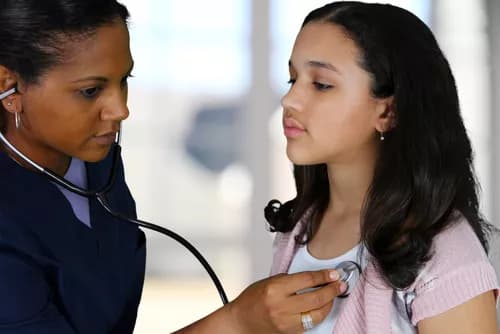
One Approach Can Prevent Teen Obesity, Eating Disorders, New Guidelines Say
A single approach can prevent both obesity and eating disorders in teenagers, according to new guidelines from the American Academy of Pediatrics.
Scientific evidence summarized in the new recommendations shows that physicians and parents can ward off problems at both ends of the weight spectrum by avoiding focusing teens' attention on weight or dieting, and instead encouraging a healthy, balanced lifestyle.
The guidelines, which will be published online Aug. 21 in Pediatrics, were developed in response to growing concern about teenagers' use of unhealthy methods to lose weight. Teens who use these methods may not fit doctors' or parents' image of eating-disorder patients, since most are not excessively thin. However, their quick, substantial weight loss can trigger medical consequences seen in people with anorexia nervosa, such as an unstable heart rate.
"This is a dangerous category of patient because they're often missed by physicians," said Neville Golden, MD, professor of pediatrics at the Stanford University School of Medicine and a lead author of the new guidelines. "At some point, these patients may have had a real need to lose weight, but things got out of control."
Up to 40 percent of patients now admitted to some eating disorder treatment programs fit this easy-to-miss category, said Golden, who is also chief of adolescent medicine at Lucile Packard Children's Hospital Stanford and a physician with the hospital's Comprehensive Eating Disorders Program.
Evidence-based strategies
The new recommendations include five evidence-based strategies that pediatricians and parents can use to help teenagers avoid both obesity and eating disorders, and apply to all teens, not just those with weight problems. Three recommendations focus on behaviors to avoid: Parents and doctors should not encourage dieting; should avoid "weight talk," such commenting on their own weight or their child's weight; and should never tease teens about their weight. Two recommendations focus on behaviors to promote: Families should eat regular meals together, and parents should help their children develop a healthy body image by encouraging them to eat a balanced diet and to exercise for fitness, not weight loss.
"Scientific evidence increasingly shows that for teenagers, dieting is bad news," Golden said. Teens who diet in ninth grade are three times more likely than their peers to be overweight in 12th grade, for instance. And calorie-counting diets can deprive growing teenagers of the energy they need and lead to symptoms of anorexia nervosa, which may even become life-threatening. "It's not unusual for us to see young people who have rapidly lost a lot of weight but are not healthy; they end up in the hospital attached to a heart monitor with unstable vital signs," Golden said.
Negative comments about weight can also be detrimental to a teen's health, Golden said. "Mothers who talk about their own bodies and weights can inadvertently encourage their kids to have body dissatisfaction, which we see in half of teen girls and a quarter of boys," Golden said. Such dissatisfaction is associated with lower levels of physical activity and with use of vomiting, laxatives and diuretics to control weight.
Eating together
Family meals, on the other hand, protect against weight problems. The mechanism isn't certain, but Golden thinks it may be partly due to the opportunity for teenagers to see their parents modeling healthy eating. "Pediatricians can encourage families to have family meals as often as possible," he said. "It doesn't have to be every night."
The new advice is important in part because, although childhood obesity rates have begun to drop, obesity rates in adolescents have not declined. Helping teens maintain healthy weights without veering toward obesity or an eating disorder is more challenging than it is for young children. "Adolescents are also dealing with other issues, such as teasing from peers and body-image concerns," Golden said. "A 3-year-old may not be worried if she's a bit overweight, whereas an adolescent may try unhealthy weight-loss methods like fasting or diet pills and end up in a vicious circle of more weight gain."
The above post is reprinted from materials provided by Stanford University Medical Center. The original item was written by Erin Digitale.Note: Content may be edited for style and length.
Disclaimer: DoveMed is not responsible for the adapted accuracy of news releases posted to DoveMed by contributing universities and institutions.
Primary Resource:
Golden, N. H., Schneider, M., & Wood, C. (2016). Preventing Obesity and Eating Disorders in Adolescents. Pediatrics, 138(3), e20161649.
Related Articles
Test Your Knowledge
Asked by users
Related Centers
Related Specialties
Related Physicians
Related Procedures
Related Resources
Join DoveHubs
and connect with fellow professionals

0 Comments
Please log in to post a comment.